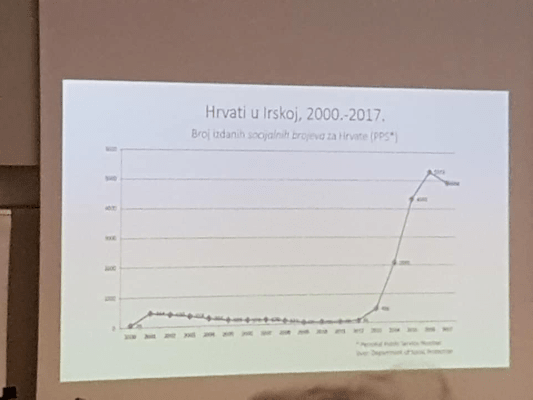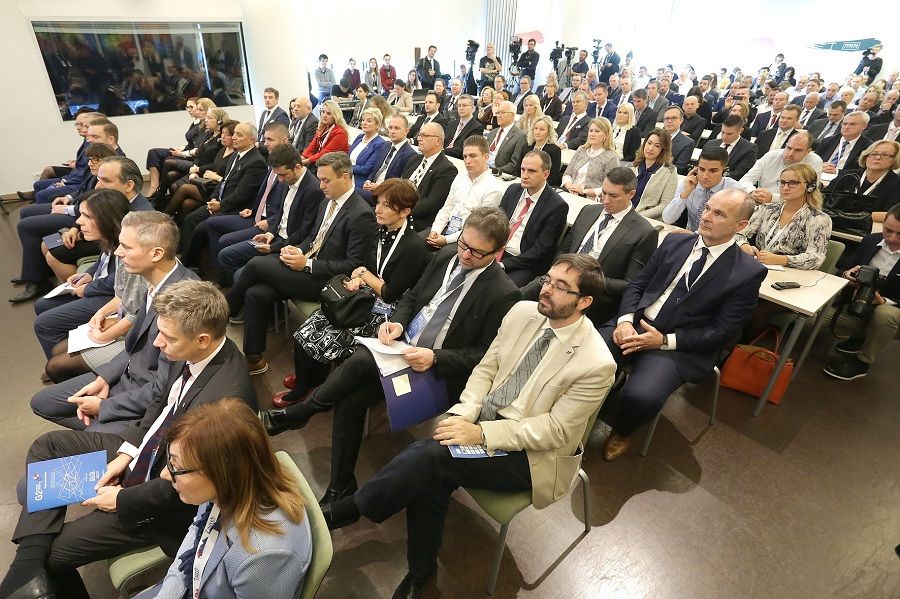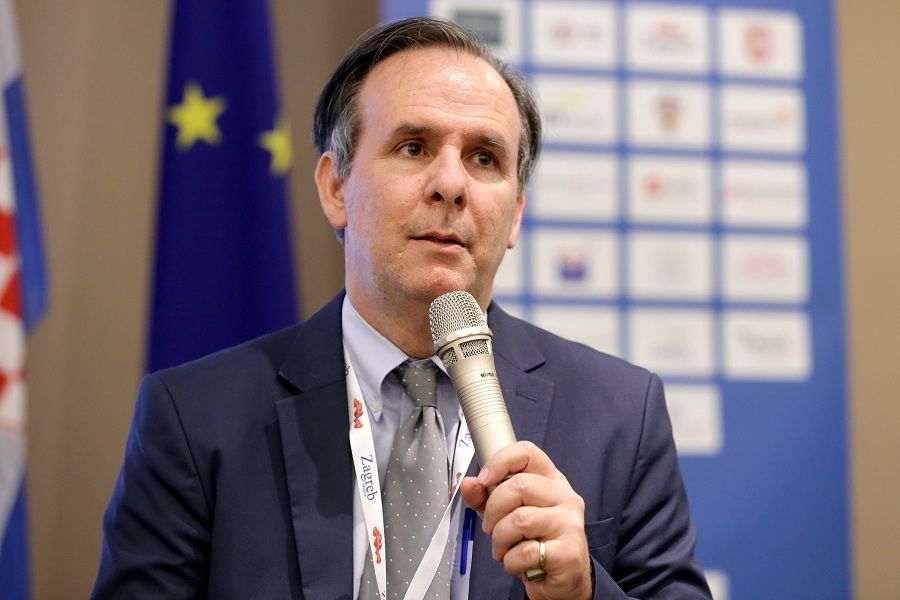Croat Scores Big on German Game Show "Who Wants to Be a Millionaire"
German volleyball coach Michaela Barišić, whose parents are from Croatia, won 250,000 euro, or more than 1.8 million kuna, on the German version of the TV game show Who Wants to Be a Millionaire, reports 24sata.hr on January 19, 2019.
Michaela decided she would not risk her prize, so she gave up on the 13th question out of the possible 15, and went home with the previously won 250,000 euro. If she answered the question worth 750,000 euro, she would get an opportunity to play for the maximum amount – an incredible two million euros.
The question that made her give up was: What is officially listed as having the maximum weight of 25 grams? The possible answers were: German postal letter, a dart arrow, a Nürnberger sausage and a fine ounce of gold. If she did not give up, Michaela would offer the dart arrow as the answer. The right answer was the sausage, so her decision not to answer was wise.
Michaela has lived in Germany for a long time, more precisely in Baden-Württemberg, and she came to the show together with her mother Vera. The mother of two impressed everyone with her great general knowledge. The game show host Günther Jauch told Michaela that she had very good nerves, like a real gambler.
“I will have to get used to having won so much money. I don't have any major plans. This may sound strange to you, but the TV set I have at home is 12 years old, so I will probably buy a new one,” said Michaela for Slobodna Dalmacija. “Of course, we plan a nice holiday and vacation in Croatia. My parents are from Slavonia; they are now retired and live in Pula. We have a lot of relatives in Đakovo. I try to come to Croatia at least once a year. In Germany, Who Wants to Be a Millionaire has been broadcast for 20 years, and I've always dreamed of sitting in that hot chair,” Michaela said.
Michaela lives in Baden-Württemberg with a partner and two children, and she applied for the show primarily because she wanted to use the prize to give a holiday to her parents as a present. "They are Croats who used to work in Germany, and the only thing they ever saw was the A8 motorway towards Salzburg and Croatia,” she said.
More news on the Croatian diaspora can be found in our special section.
Translated from 24sata.hr (reported by Višnja Kragić Mahmutović).
Croatian Diaspora Projects Get 243,000 Euro from Government
ZAGREB, January 1, 2019 - The Central State Office for Croats Abroad approved 1.8 million kuna for projects in the fields of education, culture and sport intended for Croats living outside Croatia plus one-off grants for Croatian diaspora in need in Bosnia and Herzegovina, Serbia and Germany.
The funds were approved following public calls advertised by the Central State Office for Croats Abroad, and as many as 761 applications were received.
The endorsed grants were allocated to no-profit-making associations and individuals in several countries and their amounts range between 6,000 as one-off grants to 80,000 kuna, which was the highest allocated assistance earmarked to the Croatian National Council in Subotica, in the northern Serbian province of Vojvodina.
The one-off grants amounting to 6,000-8,000 kuna were earmarked for destitute persons.
Also, Croatian expat communities in Chile, Argentina, Paraguay and New Zealand were among the recipients.
The contract-signing ceremonies are to be held in January.
More news on the Croats abroad can be found in our Diaspora section.
Croatian Diaspora Welcomes Citizenship Act Amendments
ZAGREB, December 27, 2018 - The government's proposal to leave out generational and language restrictions for members of the Croatian expatriate community applying for Croatian citizenship has been described as a major positive change by the Croatian diaspora representatives, yet despite that and the interest of expatriates, Croatia, which in recent years has lost as many as 350,000 people, lacks a serious returnee policy and does not know how to use the potential of its expatriate community, estimated to have around three million members worldwide.
The bill of amendments to the Citizenship Act, adopted by the government in December, leaves out the generational restriction for acquiring Croatian citizenship for descendants of emigrants, which means that all descendants of Croatian emigrants will be able to apply for Croatian citizenship and not only lineal descendants, and they and their spouses will no longer have the obligation to know the Croatian language, the Latin script and Croatia's culture and social order.
The government has thus lifted the restrictions it introduced in 2011, saying at the time that "the large number of citizenship applications are likely due to the fact that expatriates need Croatian citizenship exclusively for the sake of visa-free entry and work in more developed countries."
The government's Office for Croats Abroad has said that Croats in the diaspora will be very pleased with the latest amendments.
According to data from the Croatian Catholic Mission, available to the Office for Croats Abroad, around three million Croatian emigrants and their descendants live outside of Croatia. Most of them, around 1.2 million, live in the United States, around 350,000 live in Germany, 250,000 each in Argentina and Canada, and around 200,000 in Chile.
Over the past three years, the Office for Croats Abroad has granted 336 scholarships for Croatian language studies in Zagreb. More than two thirds of those who have been granted the scholarships are descendants of Croatian emigrants from Latin America.
Explaining the nature and rate of emigration from Croatia, demographer Stjepan Šterc has said that people have been emigrating from Croatia for economic and political reasons since the end of the 19th century. During the 1960s emigration tide, around 450,000 people emigrated to Western European countries, and during the 1990s Homeland War, Croatia lost around 480,000 people, he says. Over the past few years, another 350,000 people left the country, Šterc claims.
"One should not expect the long-awaited amendments to the Citizenship Act to bring expatriates back," he believes. "That project should be much more serious than just simplifying the procedure for obtaining citizenship. There was never a strategy to stop emigration and increase returns," he says, warning that Croatia also lacks a returnee policy concept.
Šterc believes that returnees should be given taxation and investment incentives and that Croatia should define a returnee policy on the model of Ireland or Israel.
As for whether it is realistic to expect expatriates to return to a country whose population is leaving, Šterc says that he would say that "Croatia is a transit country also for its expatriates."
"The children of expatriates who obtain Croatian citizenship seek opportunities in other European countries because the Croatian passport enables them to do so," he said, noting that despite its potential, the expatriate community had never been viewed as a strategic advantage.
More news on the Croats abroad can be found in our Diaspora section.
Croat Minority in Serbia Praises Serbian President Vučić
ZAGREB, December 23, 2018 - The leader of the Croat minority in Serbia, Tomislav Žigmanov, has praised Serbian President Aleksandar Vučić as a reliable partner in addressing problems faced by the Croat community in the country, Croatian-language media in the northern province of Vojvodina said on Saturday.
The community centre and a bridge in the Croat-majority village of Monostor are being reconstructed, a Croatian language instruction office has been opened at the University of Novi Sad, the network of Croatian-language schools has been expanded, and the process of granting the use of the house in Petrovaradin where Ban Josip Jelačić, the governor of Croatia in the mid-19th century, was born, to the Croat community is under way, Žigmanov told reporters during a visit to Tavankut where he inspected the reconstruction of the local Croat community centre.
"We appreciate President Aleksandar Vučić as more than a reliable partner in addressing problems faced by the Croat community in Serbia, which we raised in February this year," Žigmanov said, adding that this would help relax overall Croatian-Serbian relations. "I am certain that the improvement of the position of Croats in Serbia will be looked favourably upon by the government in Zagreb," he stressed.
Bogdan Laban, the mayor of Subotica and a member of the ruling Serbian Progressive Party, said that about 40,000 euro had been allocated, with the support of the central and regional government, for the reconstruction of the community centre in Tavankut.
"We take care of all our ethnic minorities, including the Croat community with whom we have excellent relations. We take account of their needs and that will continue in the future," Laban said.
Croatian President Kolinda Grabar-Kitarović and her Serbian counterpart Vučić met in Tavankut in June 2016.
More news on the status of the Croat minority in Serbia can be found in our Diaspora section.
Croatian Prime Minister Visits Croats Living in Austria
ZAGREB, December 18, 2018 - Croatian Prime Minister Andrej Plenković met representatives of Croats living in Austria on Monday and told them Croatia would continue to support their activities.
Plenković arrived in Vienna to attend the EU-Africa summit the central event of which will be held Tuesday.
"Here are the representatives of all Croatian organisations in Austria, at least in Vienna and the area," said Petar Tyran, head of the Croatian Centre in Vienna where the meeting was held.
He also informed the prime minister Croat organisations in Austria needed financial support to be able to keep the media for the Croat minority in Austria.
Plenković said it is a priority for his government to provide for Croats around the world, notably in countries in which they are an autochthonous minority, as it is the case in Austria.
"Austria is one of the main countries for Croatia's foreign trade, investments, a country that helped Croatia during the Homeland War in which you played a great role of support and understanding for everything that was happening in the homeland," Plenković told Austrian Croats.
He also mentioned the new law on citizenship which the government had forwarded to parliament and which is expected to facilitate the process of obtaining citizenship to Croats living abroad.
More news on the relations between Croatia and Austria, as well as Croats living in Austria, can be found in our Politics section.
Croatia Adopts Declaration on Bosnia and Herzegovina Croats' Status
ZAGREB, December 14, 2018 - The Croatian parliament on Friday adopted, with 81 votes for to 11 against and four abstentions, a declaration on Bosnia and Herzegovina Croats’ status, which calls for amending the Constitution of Bosnia and Herzegovina and the election legislation for the purpose of enabling the Croats, the least numerous constituent people, to be equal to the other two peoples in that country.
The six-point document underscores that for the successful functioning of Bosnia and Herzegovina at all levels, it is crucial that all its constituent peoples and citizens are equal and that they have full confidence and trust in their country's future.
The declaration warns about attempts to marginalise the Croats. In this context, it is underscored that for the third time, the Croat representative in the tripartite presidency has been elected thanks to ballots cast by Bosniaks, and that this is contrary to the spirit of the Dayton peace accords.
The document warns that such a scenario is possible even if all the eligible Croat voters in Bosnia and Herzegovina cast their ballot for just one candidate, which does not mean that he or she will win the seat of the Croat representative in the presidency.
The declaration also underlines several times that Croatia supports the sovereignty of Bosnia and Herzegovina and recalls that Zagreb backs and assists Bosnia and Herzegovina's European Union membership bid.
It calls for efforts to be taken to "consensually amend the Constitution of Bosnia and Herzegovina and its election legislation so as to ensure the harmonisation of relations between its three constituent peoples and equality of all its citizens."
The document calls for ensuring simplification, transparency, manageability and cost-efficiency of the internal organisation of Bosnia and Herzegovina. Institutions in Croatia are called to continue advocating and supporting fast changes that will ensure the equality of all the three constituent peoples and citizens of the neighbouring country, and they are urged to intensify assistance to institutions of strategic importance for the Croat people in Bosnia and Herzegovina.
The document, which was put to a vote by the parliamentary committee for Croats living outside Croatia, was supported by lawmakers from the ruling Croatian Democratic Union (HDZ) and some members of the parliamentary group of the Work and Solidarity Party of Zagreb Mayor Milan Bandić, as well as representatives of the Independents for Croatia party and a few other MPs.
Those who abstained from voting were independent MPs Marko Vučetić, Tomislav Žagar, Vlaho Orepić and Mario Habek.
Those who were against the document were lawmakers from the largest opposition party – the Social Democratic Party (SDP) while deputies from another two opposition parties – the MOST and the Živi Zid – did not attend the vote.
During the debate before the vote, SDP parliamentarian Joško Klisović said that the purpose of the declaration should not be only to point to the status of the local Croats but also to determine what Croatia can do to help them to improve their situation. He also noted that it was not the Croatian parliament's duty to discuss the constitution and election law of a neighbouring country.
MOST leader Božo Petrov accused the ruling HDZ of hypocritically offering insincere help to the Croats in Bosnia and Herzegovina.
On the other hand, HDZ bench whip Branko Bačić called on MPs to overcome their narrow partisan interests and support the declaration.
More news on the status of Croats in Bosnia and Herzegovina can be found in the Diaspora section.
Easier Citizenship for Members of Croatian Diaspora
ZAGREB, December 13, 2018 - Acquiring Croatian citizenship should be easier for Croats abroad and Croatian diaspora, the government proposes in amendments to the Citizenship Act which it sent to parliament on Thursday.
This bill of amendments is aimed at simplifying the acquiring of Croatian citizenship, which will recognise and valorise the economic, demographic, social, scientific and other potential of Croatian emigrants, said Interior Minister Davor Božinović.
Since 1992, when the Citizenship Act came into force, nearly 1.1 million foreigners have been naturalised, which does not include children of Croatian citizens, he added.
The amendments raise the age limit for registering in the register of Croatian citizens to 21 for persons born abroad whose parent was a Croatian citizen when they were born.
The amendments leave out the generational restriction for acquiring Croatian citizen for descendants of emigrants and they and their spouses will no longer have the obligation to know the Croatian language, the Latin script and Croatia's culture and social order.
A spouse whose naturalisation would represent an interest for the state must have legally lived in Croatia for one year.
Minors, one of whose parents acquired Croatian citizenship as an emigrant or a descendant of emigrants, can also be naturalised.
A person who renounced Croatian citizenship as an adult can no longer be granted citizenship. Citizenship can be lost if it was acquired based on marriage for gain or false presentation or fraud.
Prime Minister Andrej Plenković said the bill was part of promises from talks with the government's Office for Croats outside Croatia.
More news on the Croatian diaspora can be found in our special section.
Plenković to Discuss Status of Croats in Bosnia at EU Summit
ZAGREB, December 12, 2018 - At the EU summit on Thursday and Friday, Croatian Prime Minister Andrej Plenković will once again address the situation in Bosnia and Herzegovina after last October's general election and the status of Croats in Bosnia, a source from the European Council has said.
Croatia's Prime Minister Andrej Plenković has asked that he be allowed to inform leaders of the latest situation in Bosnia and Herzegovina following the election, the source said.
Cyprian President Nicos Anastasiades has asked to speak about Serbia and Kosovo, the source added and explained that it is the duty of the president of the European Council to enable that when state leaders so request. The debate on Bosnia and Herzegovina, Kosovo and Serbia will be held within the framework of foreign policy issues which is on the summit's agenda.
At the last EU summit on 18 October, Plenković informed his colleagues of the status of Croats in Bosnia and Herzegovina, saying that the majority Bosniak population once again outvoted the less numerous Croats in the election the Croat member in the country's three-man Presidency.
"I think that after my exposition, most colleagues only then realised the dimension of the problem. We have to understand that for someone who is a little further away from our region, that is hard to comprehend. The intervention was supported by Bulgaria's Premier Boyko Borisov, Hungary's Viktor Orban and, interestingly, Spain's Prime Minister Pedro Sanchez, French President Emmanuel Macron, and the EU High Representatives for Foreign Affairs and Security Policy Federica Mogherini also acknowledged our arguments," Plenković told reporters after the October summit.
EU state leaders will meet on Thursday and Friday in Brussels for a regular December summit.
In the meantime, Croatia Parliament has ended a debate on the Declaration on the status of Croats in Bosnia and Herzegovina (BiH). Foreign Minister Marija Pejčinović Burić voiced hoped that it will be adopted with the broadest consensus possible, as did Božo Ljubić, chair of the parliamentary Committee on Croats outside Croatia, which proposed the Declaration.
I hope the amendments submitted will be constructive and that the Declaration can be adopted with the broadest consensus possible. It would be good if we showed the broadest unity possible on what we think about and want for the Croat people in BiH, the minister said.
This is an extremely important document whose value is reflected in a clear and unambiguous message of support to the Croat people in BiH as well as a message of friendship to BiH, she added. I hope the Declaration will be an expression of support from us all, independently of political or any other affiliation, said Pejčinović Burić.
Ljubić, of the ruling HDZ party, said the biggest benefit of today's debate was that the important topic of the Croat people in BiH was in the focus of Croatia's politics and public.
"We sent Croats in BiH the message that Croatia is there for them. We shed light on the importance of BiH and the decisions made there and those making them," he said, adding that BiH and Croatia had to rely on each other and that Croatia, even if there were no Croats in BiH, should deal with BiH. "Because the state is still unfinished, BiH remains a certain cause for concern, notably for its neighbours."
Ljubić agreed with the amendments submitted to the Declaration asking to value the role of the Croat Defence Council. He said that, with good will, the Croatian parliament could reach a solution that would facilitate a broad consensus on the Declaration. He called for doing that in good faith and constructively so that parliament could adopt the Declaration on Friday.
Arsen Bauk of the opposition Social Democrats said the Declaration's main messages should be respect for international agreements and the rule of law. We must not deviate from diplomatic practices and put emphasis on state bodies' obligations so as to improve the position of Croats in BiH and clearly condemn some occurrences, he added.
More news on the status of Croats in Bosnia and Herzegovina can be found in our Diaspora section.
Life as a Foreigner at Croatian Diaspora Conferences
November 14, 2018 - What is it like being a foreigner at a Croatian diaspora conference with no Croatian heritage? Some observations of a British fly on the wall after recent conferences.
I will confess to a mild fascination with the Croatian diaspora, a fascination which grows stronger the more I find myself immersed in its complexities. And there is nowhere more fascinating to observe the Croatian diaspora than at the various conferences that are held each year, with the aim of better connecting the diaspora with the Homeland.
My knowledge of the diaspora is rudimentary, but growing all the time. For the first 12 years of my life on Hvar, contact with Croatians who lived abroad was mostly limited to Aussies and Kiwis with connections to the island who loved Total Hvar, as it gave them an English-language connection to the island of their father and grandfathers, and I will never forget finding a Facebook group in Chile sharing an article I wrote about the almost deserted village of Zastrazisce on eastern Hvar:
"Look," said one in Spanish. "An Englishman has put a picture of our village church online. I have never seen it before, but my father told me so much about it."
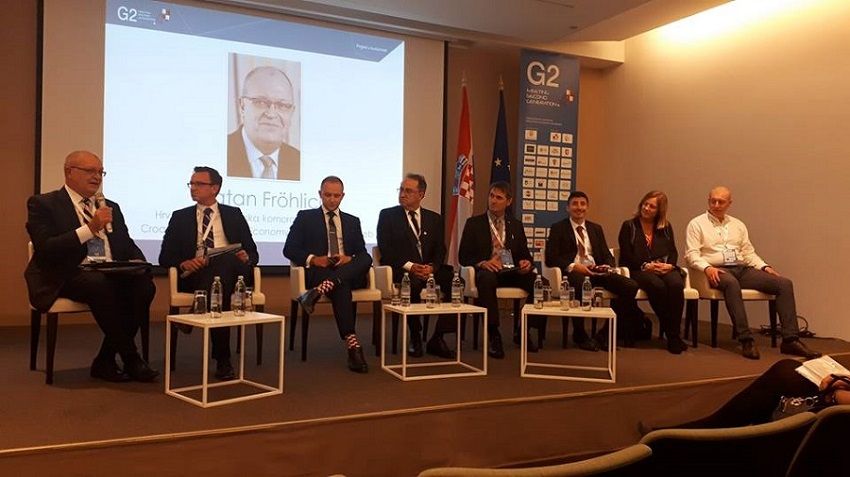
Looking back now at the origins of TCN, I have to laugh. I knew that the diaspora was a key market for us for readership - after all we were supplying news from the Homeland in a language they could understand. I knew little of the politics of the diaspora back then, and I was determined to have a high-profile interview on the first day to show we were a serious news organisation. And an interview with the Minister of Foreign Affairs was quite a coup, right?
It did not take me long to deduce from the torrent of abuse from Australia that the choice of Vesna Pusic on the opening day was perhaps not the smartest. For some in the 1941 Australian diaspora timewarp, TCN was some UDBA conspiracy, funded by Soros or Putin (or both) with a mission to bring Croatia within Greater Serbia.
I decided that the relationship between TCN and the diaspora was not going to work. While the abuse did not bother me, the intensity of it surprised me. If these people had so much capacity for hatred, why not put it into something useful and positive for the Homeland they professed to love?
And then slowly, email after email, I realised that there was much more to the Croatian diaspora than that vocal Aussie brigade. A much bigger section of the diaspora that wanted to connect, to invest and to look to the future, not dwell on the past. Young Croatian entrepreneurs here who wanted access to diaspora markets and investments, for mutual gain. And the more I looked, the more youthful energy and determination I saw, and this connection of young Croats and at home and abroad is a real positive, something addictive which - if managed and organised correctly - has the potential to bring effective and permanent positive change to this country.
And then I was invited to speak at a diaspora conference in Osijek this summer. Apart from the chance to reconnect with wonderful Slavonia after far too long in a city I think is one of the most underrated in Croatia, I was more than curious at how these events look a little closer up. Language and cultural differences are the two obvious things to note when looking around the room. And then when you look a little closer, the absence of politicians apart from the opening ceremony and photo shoot, and the different branches of the diaspora - those who want to dwell on and remember the past and a growing number of the younger generation who want to connect, look to the future and get some business done.
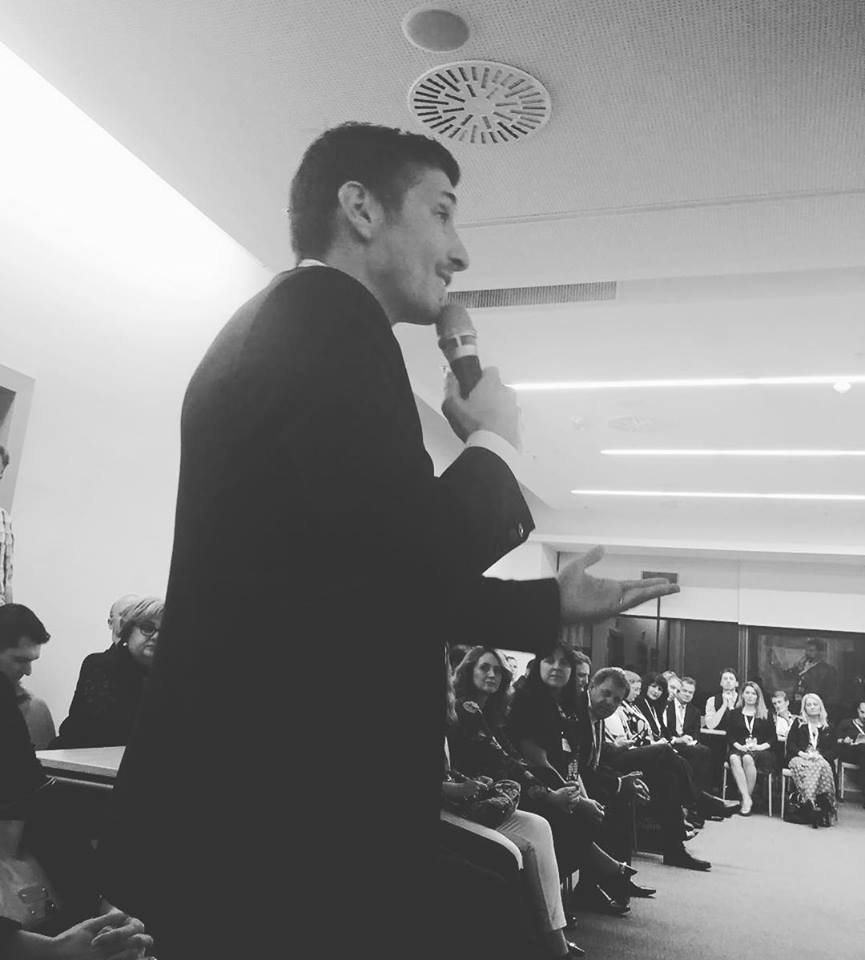
In a way, I guess I feel a part of a diaspora community too. A Brit married to a lovely Dalmatian and living here for 16 years is a different version of a Venezuelan who comes home to his grandfather's country every two years, or an American second generation diaspora with three words of the mother tongue to his name. It is a real melting pot, and whatever the beliefs - past v present, entrepreneurship versus respecting traditions, all are united in their love of the Homeland, and the desperate desire to see it succeed. At such moments, I feel a total outsider - as a Brit, I have never had such passion for the Motherland, nor gone through the trauma of war or emigration - or both.
What you get out of a diaspora conference can largely be determined with who you hang out with, and I am very grateful to Ognjen Bagatin - Mr. Connected himself - for his tireless enthusiasm and energy in bringing like-minded people together with a view of a brighter Croatia tomorrow. Here he is, above, telling the diaspora that they are Croatia's greatest ambassadors in developing Croatia's medical tourism story.
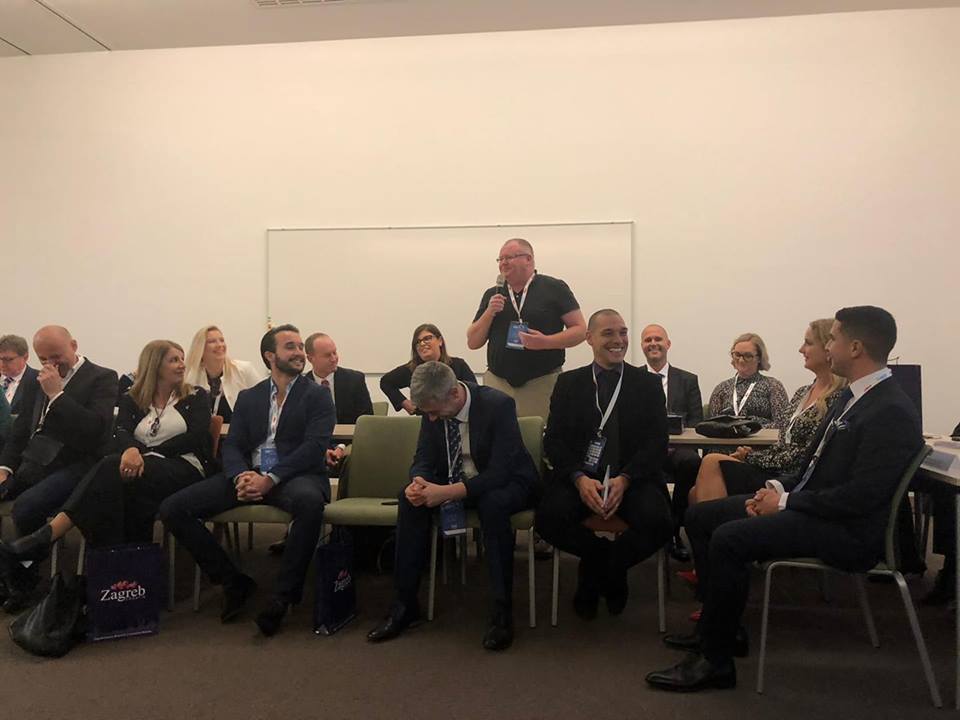
One very nice thing about this week's G2.4 diaspora conference in Zagreb was the session where everyone was asked to introduce themselves and say why they were here. There was laughter for an Englishman trying to speak Croatian, but I was struck too at the number of people who struggled with the mother tongue and yet tried to get out a few words. One South American wanted to present himself in Spanish, as that was his other heritage - it did not matter that most could not understand.
I liked that.
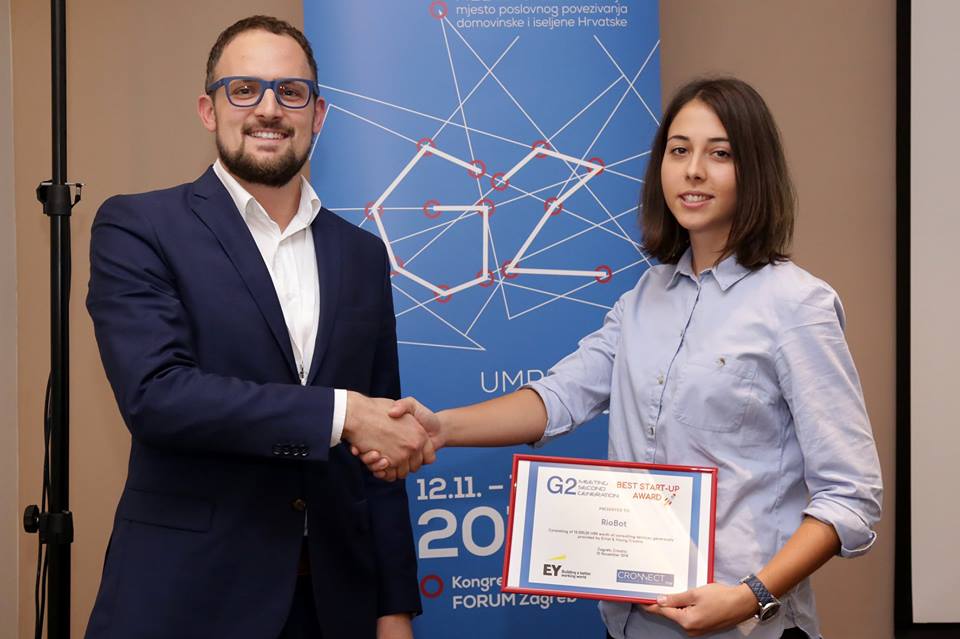
I like also the youthful energy. Young people in Croatia with bright ideas, older Croatian diaspora with cash to invest. And not a government agency in sight. If that direct bond can be nurtured and developed, it could prove to be very significant in Croatia's future in the years to come. One session at G2.4, for example, was ten Croatian startups pitching their new businesses and looking for investment. There was plenty of interest, and good luck to all ten, including winner Rio Bot, whose CEO Belma Gutlic, left, is seen picking up her award from Ante Lucic.
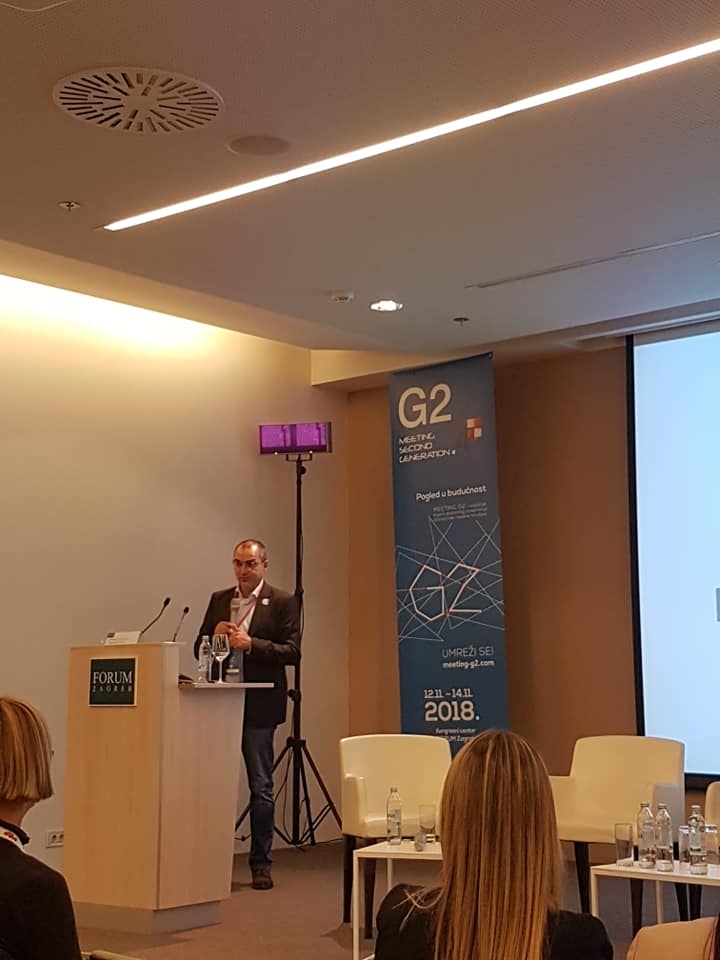
Diaspora conferences also have great speakers, and I particularly enjoyed Nenad Bakic at G2.4 with his very dark portrayal of perceptions of life in the modern Croatia, followed by his uplifting report on his IT efforts to provide a better education for the youth of Croatia today. You can read more about that here.
I get the impression that the diaspora is getting more organised, and connections with the Homeland, without going through lecherous State institutions, are getting stronger. Although they are all Croats, the emigration stories come from different centuries and are located on different continents, and it will take time. But there are wise old heads and bright young minds in North America, South America, Australasia and parts of Europe, who are slowly coming together and strengthening connections with the Homeland.
And unlike in Croatia, where a foreigner's opinion is not welcome, the Croatian diaspora not only are interested, they encourage you to speak. Here is one fat Englishman, for example, at the 3rd Croatian Diaspora Congress in Osijek this summer - see video above.
In many ways, the Croatian diaspora is a mirror of Croatia itself. Diverse and disorganised, and struggling to find its feet. But unlike Croatia - at least its State institutions, the diaspora is getting organised on all continents - slowly, but surely - and connecting with the entrepreneurial young generation of Croatia.
It is a pleasure to watch from the sides and support through TCN.
Until the next conference...
For the latest from the Croatian diaspora on TCN, follow our dedicated section.
Croatian Diaspora Business Conference Meeting G2.4 Ends
The Meeting G2.4 "A Look in the Future" conference has concluded. During two days, it brought together at the Forum Congress Centre in Zagreb more than 200 participants, including more than 70 successful businesspeople of Croatian origin from 19 countries. The conference was aimed at creating business links between the diaspora and Croatia and featured seven panel discussions on various topics, numerous networking sessions and a competition of Croatian startups.
One of the main conclusions of the Meeting G2 conference is that the state should take advantage of the potentials of successful businesspeople of Croat descent, especially in distant markets, and appoint them as business representatives for connecting Croatian exporters and local economies. For example, there are 425 million people living in South America, of which 600,000 Croats, but there is not a single business representative from Croatia. On the other hand, Spain has as many as 40 representatives just in Chile.
The representatives should be emigrant Croats who live in these countries and know the local markets well and who could help Croatian export companies which want to establish relevant business contacts. At the same time, they would not generate any costs because they already live and work in these countries. The potential is enormous since, at present, as much as 87% of the Croatian commodity exchange is with Europe, while the Americas and Australia account for just 3.1%, which means there is a huge potential for growth.
“It’s about time to find a direction, we need to know what we want and what we are looking for. That is why we believe that the President’s initiative regarding the branding of Croatia is of national interest! This is the key thing because the branding would connect everything – people, culture, heritage, economy. So we have everything! But if we do not sort out our ideas and find the right direction, it's just as if we have nothing! I believe that we must look optimistically into the future that we are all building for Croatia today,” said Josip Hrgetić, the president of the Meeting G2 association, the organizer of the conference.
The conference also concluded that Croatian companies, both immediately after the establishment and later on, should not only focus on positioning in the local market, but realize that the potential lies in the large global market, which means they should be oriented towards exports. These activities could be greatly helped by successful Croatian emigrants in various countries. Also, institutional efforts should be directed towards Croatian emigrant chambers in various countries that can provide relevant information on business opportunities, state incentives, and the like. Also, there is an idea about linking diaspora chambers globally, which would further facilitate the export offensive.
The MG2 conference once again underlined that there are many in Croatia who lack the will and courage to create changes, especially with regards to reducing the state administrative system, changing the legal framework, reducing taxes and creating an economic framework for large and for mid-sized and small companies.
During the conference, seven panel discussions were held. At the panel on the potential of Croatian chambers in the world, the approach of the chambers in Australia was presented. They help establish trust and transparent relationship with Croatian companies and direct them to business opportunities, both with local Croat-owned companies and with other local businesses. The panel of non-traditional forms of tourism pointed out that only unique concepts can enrich tourist offer and extend the tourist season. When the approach is enriched with positive energy and emotions, the result is a superior combination. The panel on system integrators emphasized export activities of Croatian companies and the need for recruiting highly-educated staff, and Croatian emigrants have been invited to return and work for these companies because there are open positions waiting.
Panels on innovative design in the wood industry, Croatian delicacies, real estate and blockchain in Croatia were also held as part of the Meeting G2 conference.
On the first day, a startup competition was organized together with the Cronnect.me website. The winner was RioBot, a chatbot based on artificial intelligence which facilitates booking and monitoring of scheduled appointments with various service providers.
For more on Croatian diaspora, click here.

